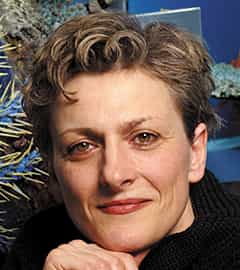Following in the Footsteps of Mary Kingsley
In 1998, Melanie traveled to Gabon, a country on the west coast of Africa. The rain forests and river habitats in Gabon may be some of the most biologically diverse places on Earth. But the many different species living there are in danger. The biggest threat comes from human activities like logging—cutting down trees faster than they can grow back. Melanie and a team of experts wanted to learn about the fish species in Gabon before it was too late. They studied the different fish species in the region, and the rivers they live in, and in the process discovered many species new to science. But for Melanie, it's not all about science. She knows that many local communities rely on fish for food. This trip was important to Melanie for another reason: she was following in the footsteps of one of her childhood heroes, a Victorian explorer named Mary Kingsley. Kingsley first traveled through the rivers and swamps of Gabon in 1894, collecting freshwater fish species along the way. Melanie led her first expedition to Gabon just over 100 years later.
Hometown: London
Position: curator of the Department of Ichthyology at the American Museum of Natural History; adjunct professor at Columbia University and the City University of New York
Education: Ph.D., University of London
Known for: research into the diversity, evolution, and conservation of fish

Melanie studies cichlids. These fish are different from most other fish because they:
fly
swim
protect their eggs and look after their young after they hatch
Correct!
Most fish species just leave their eggs to develop on their own. But cichlids look after their young until they're big enough to live on their own. One way a mother cichlid protects her young is by hiding them in her mouth when predators are near.
When Melanie travels to remote places to study fish, she doesn't talk to anyone but other scientists.
Fiction
Melanie always talks to people who live in the places she visits, especially the fishers. This is the best way to learn about certain fish—even which species are disappearing.
I love fieldwork. Nothing compares to waking up in a tent in the middle of nowhere, three days from the nearest town, surrounded by nature.

Melanie Stiassny, Ichthylologist
"When I travel, I pay particular attention to women and children. Men tend to catch fish that are sold to make money, but the women and children catch the smaller, more obscure fish.

Melanie Stiassny, Ichthylologist




 Biodiversity
Biodiversity
 Brain
Brain
 Genetics
Genetics
 Marine BiOLogy
Marine BiOLogy
 MicrobiOLogy
MicrobiOLogy
 PaleontOLogy
PaleontOLogy
 ZoOLogy
ZoOLogy
 AnthropOLogy
AnthropOLogy
 ArchaeOLogy
ArchaeOLogy
 Astronomy
Astronomy
 Climate Change
Climate Change
 Earth
Earth
 Physics
Physics
 Water
Water
